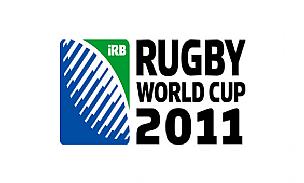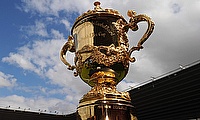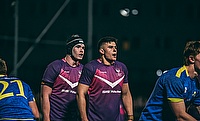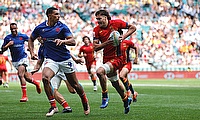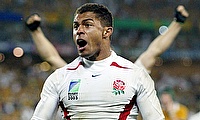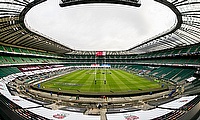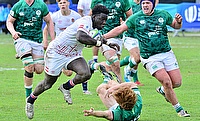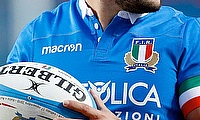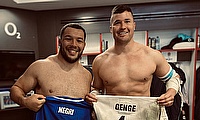2011 - A Rugby Review
As dawn breaks on 2012 and 2011 fades into the past, it is a time to reflect on what has been a fantastic year for the world of rugby. There was the World Cup, thrilling finales to domestic competitions and a long list of off-field controversies. A vintage year you might say.
At the start of 2011, things were looking rosy for English rugby. During the Autumn internationals Martin Johnson's men had beaten both Australia and Samoa and showed up well against the All Blacks and South Africa. Going into the 6 Nations they were installed as the bookies favourites. The tag seemed justified as the men in white as they ground out a win in Cardiff, thumped Italy at Twickenham and went on to beat both France and Scotland. There seemed a renewed optimism within the camp and players like Chris Ashton were making a name for themselves. Of course there was still one obstacle in their way “ Ireland in Dublin. Johnson's men had nothing to stop the men from the emerald isle, the Irish emerging victorious by 24-8. Still England took the championship, but a bitter taste was left in the mouth “ a taste that would re-emerge later in the year.
With the 6 Nations done and dusted it was back to the domestic front and Ireland's win against England seemed to be the catalyst for a surge in form by the Irish provinces. Munster, Leinster and Ulster all qualified for the Magners' League play-offs, with the Ospreys being the only non-Irish side making the top 4. Leinster's moment had come only 7 days previously in a dramatic Heineken Cup final. Half way through the game they found themselves trailing 22-6 against a determined Northampton side. Enter Jonathan Sexton, who scored 28 points including two tries, as Leinster turned on the gas. 27 unanswered second half points led to a 33-22 victory and quite possibly the greatest Heineken Cup final to date.
Northampton, not only had to deal with the disappointment of the Heineken Cup. The previous week they had been dumped out of the Aviva Premiership play-offs by the Leicester Tigers in a game which will be remembered more for a now infamous. In the 32nd minute Manu Tuilagi, unhappy with an off the ball incident dished out by Chris Ashton, took the law into his own hands. The soon to be capped centre twice connected with Ashton before handing out a thumping right hook. Both players saw yellow cards at the time, but Tuilagi would later receive a suspension for the incident.
The Premiership final lived up to all expectations and was the most thrilling domestic game all season. Saracens eventually lifted the trophy after years of disappointment, but it could have been very different. Saracens led for almost all of the game but found themselves a mere 4 points ahead with 5 minutes left on the clock. Cue to Tigers' onslaught that lasted deep into injury time. Try as they might, the Tigers just couldn't get that elusive try to steal victory and Saracens marked their re-emergence as champions on the domestic front.
With the domestic season over in the Northern Hemisphere, attention turned to World Cup preparations. Down under, the domestic season was just coming to a head. The defining moment of the competition happened on the opposite side of the World. Following the devastating Christchurch earthquake, the Crusaders switched their game against the Sharks to Twickenham. It was the first time a Super Rugby game had been played outside the tri-nations countries and was used as a fundraiser for the earthquake appeal. The season, which saw the Melbourne Reds make their debut, saw the Queensland Reds claiming their first title having defeated the Crusaders in the final.
With the Super Rugby season over, it was time for the final Tri Nations series to get underway. The competition has been re-branded the Rugby Championship and will now include Argentina, a huge step forward for the expansion of the global game. It is fair to say that 2011 was not a great year for the tri-nations. The schedule was cut from 9 matches to 6 to allow preparation for the impending World Cup. South Africa and New Zealand both used the tournament for World Cup preparations, resting key players and experimenting with different line-ups and players. It was no surprise really that Australia took the championship, their only defeat coming against the All Blacks in Eden Park.
Of course the big event of the year was the World Cup in New Zealand. The All Blacks, despite their relatively poor showing in the tri-nations started as odds-on favourites. The home nations went in targeting quarter final berths and Australia entered the tournament with high hopes. There were shocks in the pool stages, but ultimately the quarter finalists were as expected. That is not to say that the so called minnows of the game didn't make a fight of it. Samoa were unlucky not to get a result against Wales or South Africa, Georgia pushed their opponents hard but couldn't keep up the pace for a whole game and Japan gave France a fright in their opening encounter. The biggest shock came as Tonga defeated a stuttering France, but the French had done enough to sneak into the quarter finals by the skin of their teeth.
It was ultimately a disappointing World Cup for the home nations. Scotland failed to reach the quarter finals for the first time, having lost against both Argentina and England in games they could have won. Ireland produced a great win against Australia, but couldn't match that form when they faced Wales in the quarter finals. England, still with the bitter taste from the 6 Nations in their mouth, stumbled through the pool stages without setting the World alight. In the quarter finals they faced France, a side who had lost twice in the pool stages. That day England just didn't turn up and before they knew it they were trailing by 16 points at half time. Despite England's best efforts France held on for the win in what would be Johnson's last game in charge.
Wales were the most successful of the home nations, yet still went home disappointed. Having narrowly lost against the Springboks in their opening game, Wales were given a scare by Samoa before claiming a victory. Next up were two easy victories against Namibia and a Fiji side who were resting key players. The quarter finals saw Wales hitting their stride as they easily dispatched Ireland. A semi-final date with the under-performing France had been set up. It was a game that caused controversy because of one incident. Wales' inspirational young captain was sent off in the 19th minute for a tip tackle. Referee Alain Rolland applied the letter of the law, but was critisied by fans, pundits and players alike for spoiling the game as a spectacle. Still the 14 man Wales had enough chances to win the game and missed penalties cost them dear as they eventually fell by a single point.
France, described as the worst team to reach a World Cup final, now had to face hosts and favourites New Zealand in the final. As always the final did not live up to expectations. The All Blacks were clear favourites, but didn't take the game by the scruff of its neck. Instead France raised their game and should have taken the game. New Zealand found themselves 8 points ahead thanks to a Stephen Donald penalty early in the second half. It was a fairytale for the veteran fly half who two weeks earlier had been on a fishing trip when he received an unexpected call up to the All Blacks squad. Still France didn't give up and closed the gap to 1 point before Francois Trinh-Duc, who was leading the French revival, missed what can only be described as a sitter with 15 minutes to go.
In the end the All Blacks held on for a victory. On the day, they weren't the better side, but their victory was deserved. They have shown consistently over the past 8 years that they are the best side in the World. Graham Henry could step down as a World Cup winner, a task he was charged with doing when he first took the reins. 24 years of World Cup defeat had ended and it was a fitting tribute to a nation torn apart by natural disaster earlier in the year.
The end of the year was dominated by the World Cup fall out. Martin Johnson resigned as England manager. Countless tales of players over enthusiastic nights out, practical jokes and lax attitude leaked into the press. After a year that promised so much early on, it seems that English rugby has hit rock bottom. Every moment from that defeat out in Dublin has been part of the steady slide downwards. Rugby in England will recover, but what is certain is that a complete change of attitude and management is needed.
Now as we look forward to 2012 what can we expect in the world of rugby? Well domestic rugby in England looks healthy with Harlequins leading the charge both home and in Europe. The Heineken cup is proving once again it is the leading club competition in the World, who will win the title this year is anyone's guess. The 6 Nations will give a new look England a chance to prove their worth, for Wales to keep making strides forward and for Scotland to make amends for a premature World Cup exit. Then of course Argentina will make a long awaited debut in the Rugby Championship. All in all, there's lots to look forward to!

